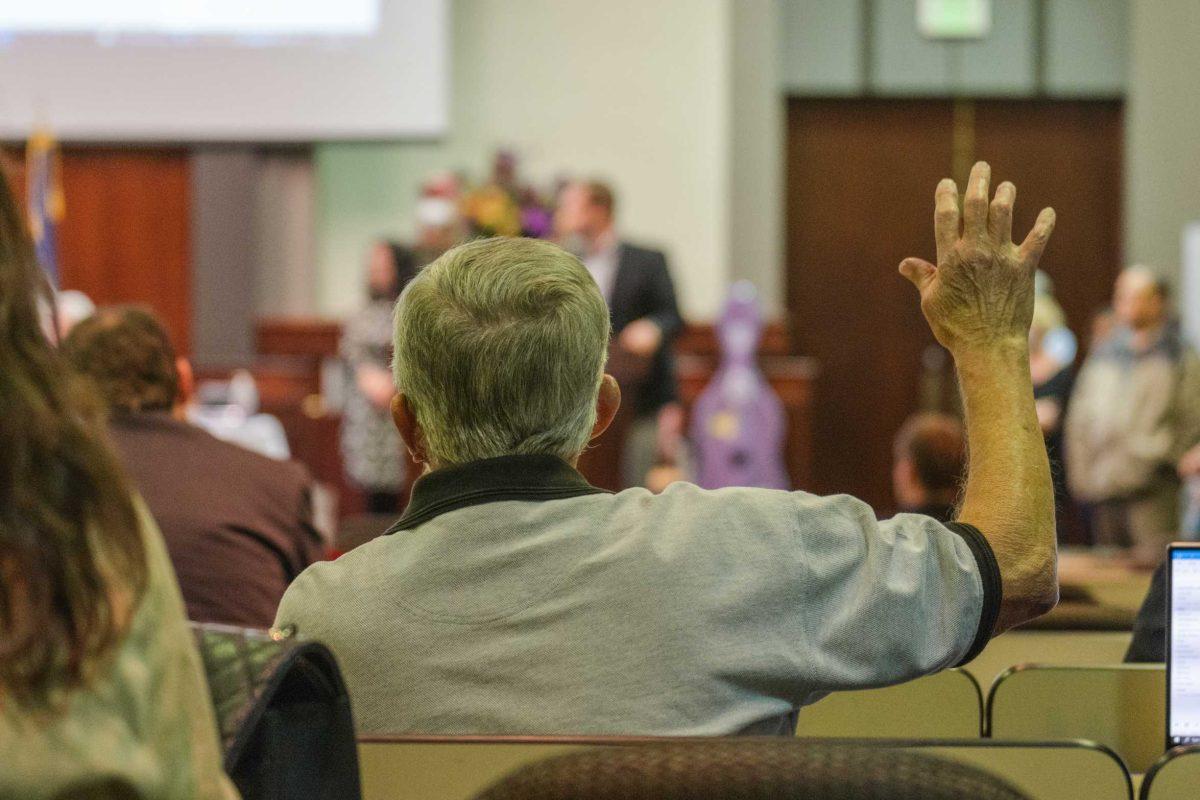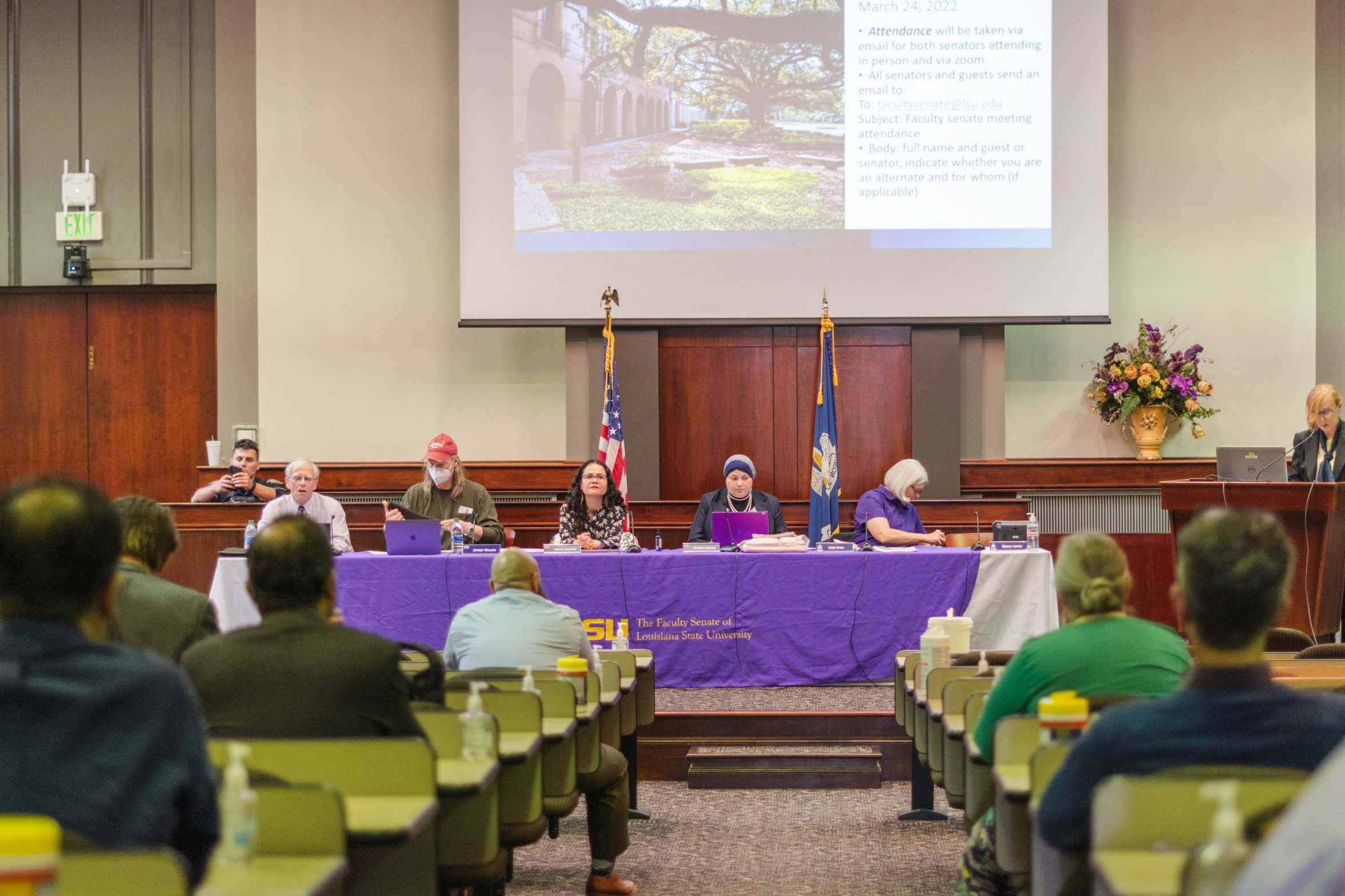LSU Faculty senators are discussing seeking a legislative carve-out to Louisiana’s open meetings law.
The Senate, which has a slew of open meetings law compliance issues dating back to their founding in 1973, received open meetings law training from the attorney general’s office on March 24. The training was derailed when senators began asking about how to become exempted from open meetings law.
That discussion has continued, with senators seriously considering seeking an amendment to Louisiana’s open meetings law.
The body has faced increased scrutiny in the months following their November meeting, when they entered an illegal executive session and kicked out members of the public, including a Reveille reporter.
In the wake of that meeting, the body has had to come to terms with its litany of other open meetings law violations, most notably their voting and record-keeping practices.
All of that tension came to a head at the March meeting, when the body underwent open meetings law training provided by the attorney general’s office, which was provided as part of an agreement the university came to following an open meetings law complaint stemming from the illegal executive session in November.
During the training, multiple faculty senators sought to understand why the Senate is subject to open meetings law and how they could feasibly comply with open meetings law.
“The way that this revised statute is written that somehow catching us in the net in which we were not originally intended to have these laws apply to us,” Daniel Tirone, a political science professor said at the meeting.
Tirone floated the idea of asking the legislature to totally exempt the Faculty Council from open meetings law, which he said would then exempt the Faculty Senate from open meetings law.
The Faculty Council is a public body made up of every LSU professor, a little over 1,600 people. The Faculty Council derives its authority from the Board of Supervisors, which is why it’s a public body.
Rep. Tanner Magee laughed at the idea of granting a total exemption to open meetings law, simply saying “no way.”
Magee, a Houma Republican and the second ranking legislator in the House, sits on the House and Governmental Affairs Committee, which is charged with handling open meetings law legislation.
LSU General Counsel Winston DeCuir also counseled against seeking a total exemption.
“Among the media in the legislature, there is no appetite to close bodies off from the public meetings laws, unless you could show them that this is so narrow,” DeCuir said.
DeCuir advised that if the Senate wants to seek an exemption, they should pass a resolution calling for the university to include a narrowly-crafted exemption in its legislative priorities for a future legislative session, or alternatively the faculty could approach a legislator on their own to seek a bill sponsor.
LSU Spokesperson Ernie Ballard said that the university would consider requesting an exemption from the Legislature if the Faculty Senate put a resolution on the president’s desk.
While Magee did not think an exemption should be granted, Rep. John Stefanski, a Crowley Republican who heads the House and Governmental Affairs Committee, was open to the idea.
“When there’s something on the books that isn’t workable or is antiquated, you know, then it’s common occurrence for us to look to try to improve upon that,” Stefanski said.
There is disagreement within the body about what the extent of the exemption should be.
At the April 6 Faculty Senate Executive Committee meeting, President Mandi Lopez said that she thought the body should be exempt, but did not specify if she only approves of a narrow exemption.
Several senators have expressed support for an exemption that would allow for a less onerous voting format. The body is required to vote viva voce, which essentially means that the public needs to be able to tell who voted and which way they voted.
Prior to examining their practices, the Senate was using a digital voting format that did not allow the public to determine this. Lopez said that moving forward, the body would use a roll call voting format.
“It is extremely time consuming to handle each vote individually by voice considering the size of the Faculty Senate and the constraints on everyone’s time in addition to the current monthly meeting time constraints,” Matt Hiatt, a coastal sciences professor said. “It’d be tough to conduct all business in the allotted time each month. So perhaps some accommodation for a digital voting system or some other means for vote tallying would be reasonable.”
Other senators would like to see an online meeting format. As written, the open meetings law only allows for public bodies to meet in a digital format during a gubernatorial declared public emergency, and even then under specific circumstances.
Wei-Ling Song, a finance professor, supports these changes.
“Technology has developed in a way that could achieve the objectives of open meeting law by using a Zoom meeting and voting tool,” Song said. “The ability to record a Zoom meeting and to post it on internet can make the meeting even more open and complete to the public than the meeting minutes.”
Kevin Ringleman, a renewable natural resources professor, said that he supported exemptions both for voting and for digital meetings, but did not rule out seeking a total exemption.
“To the extent it is easier to simply legislate the entire Faculty Senate and Council from open meetings law as opposed to identifying these line-item exemptions, I would support a blanket exemption as well, with the caveat that the Faculty Senate/Council prescribe in their constitution to abide by the spirit of transparency as they do now, with posting agendas and minutes, permitting access to the public and media, allowing for public comment, etc,” Ringleman said.
Other senators want to do away with public comments altogether.
“The Faculty Senate is there to represent the LSU faculty,” William Doerrler, a biological sciences professor, said. “I don’t think it should be turned into a public forum for anti-vaxxers and Q-anon conspiracy theories. I’d like to see this exemption, perhaps allowing public comments in writing.”
Regardless of what exemptions, if any, the Senate seeks, it won’t happen this year. Tuesday was the last day for legislators to file new bills.
While the Faculty has almost a year to decide what exemptions they will seek, it won’t happen fast enough for May’s Faculty Council meeting. The Council poses the most significant open meetings law challenges, as they are required to have at minimum 400 professors in attendance and to fully comply with open meetings law.
LSU Faculty Senate weighs seeking an open meetings law exemption
April 7, 2022
A Faculty Senator raises a hand during a vote on Thursday, March 24, 2022, inside the LSU Law Center on Highland Road in Baton Rouge, La.









